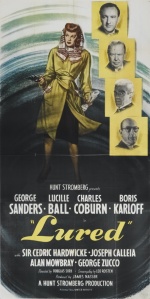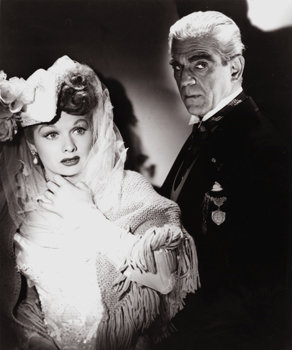 If you go solely by the current DVD cover art for Douglas Sirk’s Lured, you’ll come away thinking it’s a thriller starring Boris Karloff and Lucille Ball; possibly a Gothic melodrama in which her character marries his character and is then terrorized by him in a creepy old mansion.
If you go solely by the current DVD cover art for Douglas Sirk’s Lured, you’ll come away thinking it’s a thriller starring Boris Karloff and Lucille Ball; possibly a Gothic melodrama in which her character marries his character and is then terrorized by him in a creepy old mansion.
Or you might not.
But in any case, that’s what I thought, so I was surprised when it turned out that Karloff’s character in Lured is essentially a throwaway, and all of his scenes could be excised from the film without affecting the plot.
Of course, excising Karloff from the film would excise much of the ghoulish fun, since the sequence in which he plays a thoroughly mad former fashion designer who forces Ball to model his “latest creations” is one of the best bits in the picture, but it ultimately has very little to do with the central mystery about a poetry-obsessed killer who places ads in the personal columns.
In Lured, Lucille Ball plays Sandra Carpenter, an American dancer and actress who came to London from New York with a show. It folded after four nights and she was broke. So now she works in a dance hall called the Broadway Palladium where “50 beautiful ravishing glamorous hostesses” dance with men off the street for six pence a twirl.
It’s no picnic. After one of Sandra’s co-workers mentions that there’s just two hours left to go in their shift, Sandra responds, “Two hours in this cement mixer’s longer than a six-day bike race.” (Incidentally, Ball played a similarly occupied character on the CBS radio show Suspense in the January 13, 1944, broadcast, “A Dime a Dance.”)
When Sandra is offered a tryout for a part in the new Fleming & Wilde show, she jumps at the chance, not so affectionately referring to her current place of employment as a “slaughterhouse.”
But just as she arranges a private audition with Mr. Fleming over the phone, she sees the headline of the London Courier. Her friend and fellow taxi dancer Lucy Barnard (Tanis Chandler) has just become the eighth victim of the “Poet Killer”!
 So two very different men enter Sandra’s life, and things will never be the same for her.
So two very different men enter Sandra’s life, and things will never be the same for her.
One is the charming and insouciant Robert Fleming (played by the the charming and insouciant George Sanders), who initially wants to cast Sandra in his show, but soon wants her to play the leading lady in his own life, till death do them part.
The other is Inspector Harley Temple (Charles Coburn), who tests Sandra’s powers of observation and then enlists her in Scotland Yard after she passes with flying colors.
Their policewomen are very clever, he says, but the killer only places ads for young, beautiful women. (Sorry, ladies of Scotland Yard. No offense intended, I’m sure.)
Sandra then has to respond to every personal ad for young, unattached women. The police will write the responses, but Sandra will have to keep the appointments. A humorous montage follows, natch.
Lured is a mixed bag. Douglas Sirk is a great director, but Lured isn’t one of the films he’s remembered for. It’s well-done, and Sirk’s fascination with surface opulence masking (or possibly masking) darker forces is in full effect. The plot, however, twists and turns through so many contrivances that it’s hard to keep track of everything, let alone take any of it seriously.
It’s worth seeing, however, by anyone who’s a Sirk completist, or anyone who wants to see Lucille Ball in a glamorous leading role in a beautifully art-directed film. She didn’t have too many of those, you know, after I Love Lucy.
Pingback: Sleep, My Love (Feb. 18, 1948) « OCD Viewer
Pingback: Shockproof (Jan. 25, 1949) | OCD Viewer